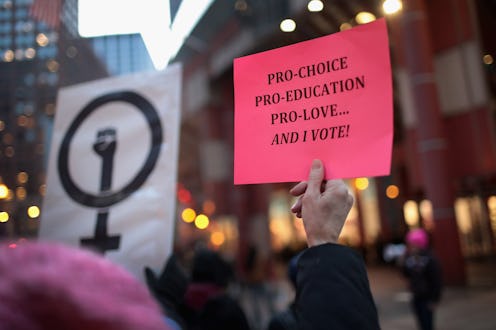News
Arkansas' Latest Abortion Restrictions Face A New Lawsuit

A series of recently passed laws could soon drastically change the accessibility of abortion services in the state of Arkansas, but they won't ever take effect if a group of advocacy organizations have anything to do with them. On Tuesday, the American Civil Liberties Union (ACLU), the ACLU's Arkansas chapter, and the Center for Reproductive Rights filed a lawsuit to challenge Arkansas' anti-abortion laws in federal court. The groups argue that the soon-to-take-effect restrictions would place "severe and unwarranted burdens" on women's right to abortion services.
"Arkansas politicians have devised new and cruel ways to rob women of their right to safe and legal abortion this year — and we're fighting back," Center for Reproductive Rights president and CEO Nancy Northup said in a statement on Tuesday. Representatives for the ACLU and the ACLU of Arkansas echoed Northup's sentiments, calling Arkansas' laws "extreme" and "burdensome bureaucratic hurdles" for women. The groups filed suit in federal district court to block four of the state's most recent laws.
The first law, Act 45, seeks to ban so-called "dismemberment abortions," which are more often called "dilation and evacuation" procedures. Hillary Schellner, a staff attorney for the Center for Reproductive Rights on Tuesday condemned the phrase "dismemberment abortion," as a non-medical term.
"You won't find it in any medical textbooks," Schellner tells Bustle. "Moreover, it's a term that was invented to stigmatize and shame women and their healthcare providers."
Act 45 would effectively eliminate dilation and evacuation procedures by categorizing them as a felony punishable by a $10,000 fine and up to six years in prison. Critics also argue this Act would require the notification of the woman’s partner or other family members, ultimately allowing them to block the abortion. It is set to go into effect on July 30.
Also set to take effect on July 30 are two other laws, Acts 603 and 1018, which dictate the handling of fetal tissue. Act 603 requires aborted fetal tissue to be buried or cremated, and Act 1018 requires any abortion for patients under 17 years old be reported to law enforcement. Finally, Act 733, which seeks to ban abortions based on "sex discrimination," would go into effect in January.
Jerry Cox, the president of anti-abortion group Family Council, called the lawsuits unbelievable and stated, "The ACLU is challenging laws designed to do things like help protect underage girls and ensure doctors know a woman’s medical history before performing an abortion
According to a press release sent out by the groups filing the lawsuit, Arkansas passed the highest number of measures restricting a woman’s access to safe and legal abortion this year and in 2015. State abortion laws, like those passed in Arkansas, have grown common despite the legal precedents that seem to make the laws non-starters. Last year, the Supreme Court ruling in Whole Woman's Health v. Hellerstedt struck down a Texas law that restricted access to abortion.
The Texas law placed burdensome restrictions on abortion clinics, requiring them to have surgical facilities and requiring doctors who perform abortions to have admitting privileges at a nearby hospital. The Supreme Court struck down the law because it increased the obstacles facing a woman seeking abortion "without providing any benefit to women's health."
The lawsuit filed in Arkansas on Tuesday seeks to prevent enforcement of the four Acts on behalf of an abortion provider in Little Rock. According to the lawsuit, Dr. Frederick Hopkins is a board-certified obstetrician-gynecologist. Under the Arkansas laws, Hopkins could face punishments for the services he provides. As several states across the country seek to similarly restrict women's access to abortion, Hopkins wouldn't be the only one adversely affected by anti-abortion legislation.